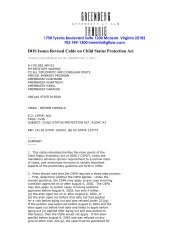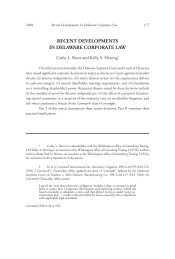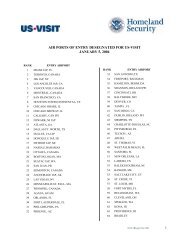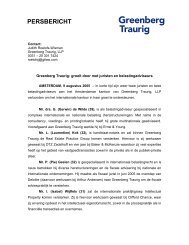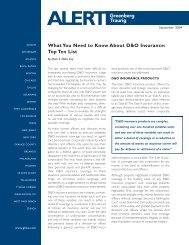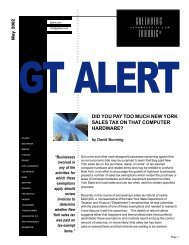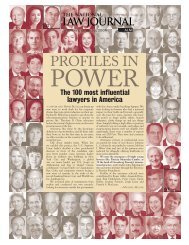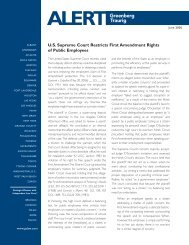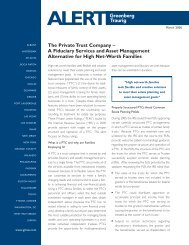The Total Return Swap Business Expands to Bank Loans
The Total Return Swap Business Expands to Bank Loans
The Total Return Swap Business Expands to Bank Loans
You also want an ePaper? Increase the reach of your titles
YUMPU automatically turns print PDFs into web optimized ePapers that Google loves.
of an interest in a bank loan should be treated as an acquisition of a “security.” <strong>The</strong> Hedge Fund is unlikely<strong>to</strong> be treated as a dealer in securities because it is neither buying from, nor selling <strong>to</strong>, cus<strong>to</strong>mers.Accordingly, unless the activities rise <strong>to</strong> the conduct of a financing business (and not the trading ofsecurities), the Hedge Fund should not be considered <strong>to</strong> have generated a taxable nexus <strong>to</strong> the UnitedStates.3. <strong>Bank</strong>ing, financing and similar activities.Treas. reg. section 1.864-4(c)(5)(i) provides that a foreign corporation is engaged in a banking, financing, orsimilar business in the United States if, inter alia, it is engaged at any point during the tax year in one ormore of six “financing functions” in the United States, including making loans <strong>to</strong> the public. In Pasquel v.Comm’r, 53 a Mexican national entered in<strong>to</strong> a transaction that had elements of being both a loan and a jointventure with a U.S. corporation. <strong>The</strong> U.S. corporation acquired two boats with funds supplied by the Mexicannational, resold the boats, and split the substantial profits with the Mexican national. <strong>The</strong> court held that,regardless of whether the transaction was a loan or a joint venture, a single transaction was an insufficientbasis for concluding that the Mexican national was engaged in a trade or business in the United States. Incontrast, in Inverworld, a Mexican financial institution that regularly engaged in five of the six enumeratedfinancing functions on a regular basis over a number of years was found <strong>to</strong> be engaged in the conduct of abanking or financing business in the United States. Although the IRS had issued a public ruling in 1973concluding that a captive foreign finance company was engaged in a financing business in the UnitedStates, it subsequently revoked the ruling because it did not apply the law <strong>to</strong> the facts. 54 Accordingly, there isno existing tax authority on the vast gray area between the two extremes represented by Pasquel andInverworld.In addition <strong>to</strong> the question of whether lending constitutes a trade or business when conducted by a foreigncorporation, the question whether lending constitutes a business for a domestic taxpayer has tax relevanceand has been extensively litigated. 55 As in the cross-border area, lending businesses have been found whenthe lending activities are frequent and continuous and conducted over a number of years. For example, ataxpayer who made eight or nine loans over a four-year period was held not <strong>to</strong> be in the lending business. 56Conversely, a person who made more than 100 loans over a five-year period was considered <strong>to</strong> be engagedin the lending business. 57 That case law supports the conclusion that sporadic lending activities do notconstitute a trade or business. 58Several of the fac<strong>to</strong>rs enumerated could assist in an analysis of whether the activities of the Hedge Fund areregular and continuous enough <strong>to</strong> amount <strong>to</strong> the conduct of a trade or business. Although untested, it isworth noting that Treas. reg. section 1.864- 4(c)(5)(i) contains a limitation specifying that the loans must bemade “<strong>to</strong> the public” in the United States for lending <strong>to</strong> constitute a trade or business. In no event will aHedge Fund be willing <strong>to</strong> acquire bank debt from a wide array of borrowers that would constitute the “public”in the commonly accepted definition of that word. 59 Instead, at least in the author’s experience, hedge fundsare very selective about which corporations they will take exposure <strong>to</strong>. In this context, a portfolio swap maypresent greater risk of net U.S. taxation <strong>to</strong> a Hedge Fund than a one- off swap or several one-off swaps. <strong>The</strong>heightened risk stems from the fact that there is a pattern of loan origination sometimes obligating theHedge Fund <strong>to</strong> take a credit that meets defined parameters without a ve<strong>to</strong> right. In that case, the economicdefeasance engaged in by <strong>Bank</strong> A could more readily be imputed <strong>to</strong> the Hedge Fund as lending. In the vastmajority of cases, however, the Hedge Fund activities will not be substantial enough <strong>to</strong> amount <strong>to</strong> theconduct of a financing business in the United States.Greenberg Traurig, LLP



